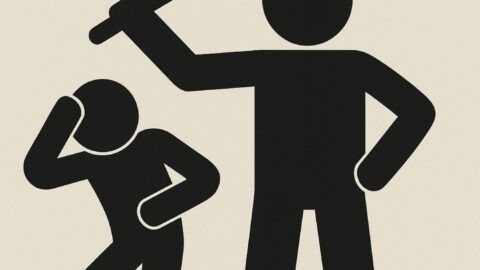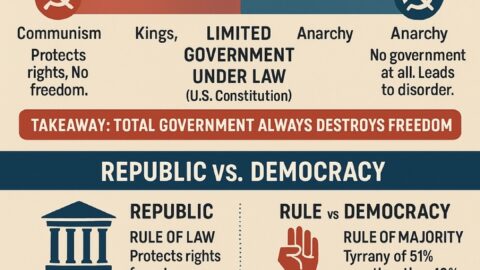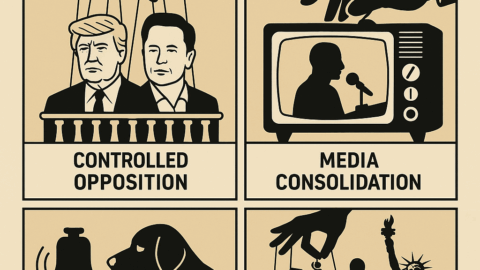“The greatest obstacle to liberty is not the existence of evil rulers, but the belief in the existence of good rulers,” 1 suggests a deep skepticism about the concentration of power and the nature of political leadership.
This perspective implies that:
Misplaced Trust: Believing in the existence of good rulers can lead people to place too much trust in their leaders, potentially allowing those leaders to accumulate excessive power without sufficient checks and balances. Even well-intentioned leaders can make mistakes or be corrupted by power, eroding individual freedoms.
Complacency: When people believe they are governed by good rulers, they might become complacent and less vigilant about holding those rulers accountable. This complacency can lead to a gradual loss of liberties as leaders exploit their trusted positions.
Centralized Power: The idea of “good rulers” can justify the centralization of power, as people might think that a benevolent leader can wield more authority for the greater good. However, centralized power is inherently risky because it can be easily abused, regardless of the leader’s initial intentions.
System Over Individuals: The quote emphasizes the importance of building robust systems and institutions that limit and distribute power rather than relying on the character of individual leaders. A system of checks and balances, rule of law, and protection of rights is essential to safeguard liberty.
I visited with a good friend, and she mentioned how Congressmen have three jobs.
- Follow the Constitution
- Follow the Will of the People
- If the Will of the People doesn’t align with the Constitution, refer back to the Constitution.
It sounds simple and should be simple.

In my personal life, I am a spirit of the law person, but when it comes to government. We need to be strict rule followers. On the federal level, if it is not in the US Constitution, then the elected leaders say they can’t do it and return it to the states and the people to figure it out.
On the state level, the 9th and 10th Amendments tell us in the rule book that if it is not found in the US Constitution’s enumerated powers on the Federal or national level, all matters refer back to the State jurisdiction.
I recently started a new job and have realized the importance of reading, following, and applying the rule book. The US and state constitutions need to be read, followed and applied.

We need to emphasize Systems over Individuals to correct the destructive course our country is taking right now. This is similar to maintaining our yards and homes as they age and decay due to wear and tear and inclement weather. Just like our families, jobs, property, and personal growth need attention, so does our civil responsibility in persevering, pursuing, sustaining, and advancing the proper function of the federated government’s enumerated and delegated powers.

- WTH!? What has the Supreme Court done to State “Rights!?”
- The American Republic has been changed to a “New Nation” through time (Part 1)
- The American Republic has been changed to a “New Nation” through time (Part 2)
We need to put our attention back on maintaining robust systems and institutions that effectively limit and distribute power to protect liberty and prevent abuses rather than relying on the character or goodwill of individual leaders. This approach is fundamental to maintaining a stable, fair, and just society.
1 – Separation of Powers:
- Legislative Branch: Responsible for making laws that are not contrary to the US Constitution and state constitutions. By having a body of representative who deliberate and pass laws that are in check with the US Constitution and within their jurisdiction. The voting power is distributed among many individuals who represent states and people.
- Executive Branch: Enforces Constitutional laws. By having a distinct executive authority, such as a president or governor, the system ensures that the enforcement of laws is separate from their creation.
- Judicial Branch: Interprets laws to make sure they are constitutional. Independent courts ensure that laws are applied fairly and can check the other branches if they overstep their boundaries.
- States: This separation seems to be regularly missed, and they must have some say in the Federal government. We must return to the Original Intent (1789) of the voluntary compact between the free, independent, and sovereign states.

(Source 2: Original Intent of the voluntary compact between the free, independent, and sovereign states 1789)
2 – Checks and Balances:
- Each branch of government has specific powers that can check the other branches. For example, the president can veto legislation, the legislature can override vetoes and impeach officials, and the judiciary can declare laws unconstitutional.
- This system prevents branches from gaining too much power and encourages cooperation and compromise.
3 – Rule of Law:
- The principle is that everyone, including leaders, is subject to the law. Laws must be clear, publicized, and stable, and fundamental rights must be protected.
- Independent judiciary ensures that laws are interpreted and enforced impartially.
4- Federalism:
- The division of power between national and state governments This decentralization means that power is not concentrated in a single national authority, allowing for diverse policies that can be tailored to local needs.
5 – Free and Fair Elections:
- Regular elections allow citizens to choose their leaders and hold them accountable. A free press, political competition, and a transparent electoral process are crucial for a democratic process in a Republic.
6 – Civil Liberties and Human Rights:
- Protecting individual freedoms such as freedom of speech, assembly, and religion. Ensuring these rights prevents the government from becoming oppressive.
7 – Transparency and Accountability:
- Institutions must operate transparently, providing the public with information about their activities and decisions. Mechanisms such as audits, investigations, and public reporting hold officials accountable.
Historical and Philosophical Context
This line of thinking aligns with the views of various political philosophers and historical figures who have emphasized the dangers of concentrated power:
- James Madison: One of the Founding Fathers of the United States, Madison argued in The Federalist Papers that the structure of government must provide a check on the potential for abuse of power because “men are not angels.” He argued that ambition must be made to counteract ambition to prevent tyranny.
- Lord Acton: A British historian who famously stated, “Power tends to corrupt, and absolute power corrupts absolutely.”
- Thomas Paine: In his writings, Paine was skeptical of government and advocated for a system that minimized the potential for tyranny. He emphasized that society is best served by institutions that protect individual rights rather than relying on the benevolence of rulers.
- John Locke: Emphasized the need for a government that protects natural rights through a system of laws and an independent judiciary.
- Montesquieu: Advocated for the separation of powers in his work “The Spirit of the Laws,” influencing the framers of the US Constitution.
Practical Implications
- Constitutional Safeguards: The implementation of a constitution with clear limits on government power, separation of powers, and checks and balances is crucial to prevent the abuse of authority.
- Vigilance and Accountability: Citizens must remain vigilant and actively participate in the democratic process to ensure leaders are held accountable.
- Decentralization: Promoting decentralization of power can help prevent the concentration of authority in the hands of a few, making it harder for any individual or group to undermine liberty.
This philosophy advocates for a more resilient and liberty-preserving form of governance by focusing on systemic protections rather than the character of individual rulers.
Practical Examples
- United States Constitution: The U.S. system of government is designed with a separation of powers, federalism, and checks and balances, ensuring no single entity can dominate.
- Parliamentary Systems: In countries like the United Kingdom, parliamentary systems with distinct roles for the executive legislature and judiciary provide a balance of power.
Benefits of System Over Individual
- Resilience: Systems and institutions provide continuity and stability, even when individual leaders change.
- Impartiality: Laws and policies are applied consistently and fairly, reducing the influence of personal biases and corruption.
- Public Trust: Transparent and accountable systems foster trust in government and public institutions.

(Source 2: The present condition of the Compact between the States in 2024)
By focusing on building strong, transparent, and accountable institutions (government, businesses, corporations, churches, schools, families, and individuals are included), societies can better safeguard liberty, ensure justice, and promote the common good, independent of the qualities of individual leaders.
- Jakub Bozydar Wisniewski ↩︎
- Original Intent by Stephen Pratt ↩︎






